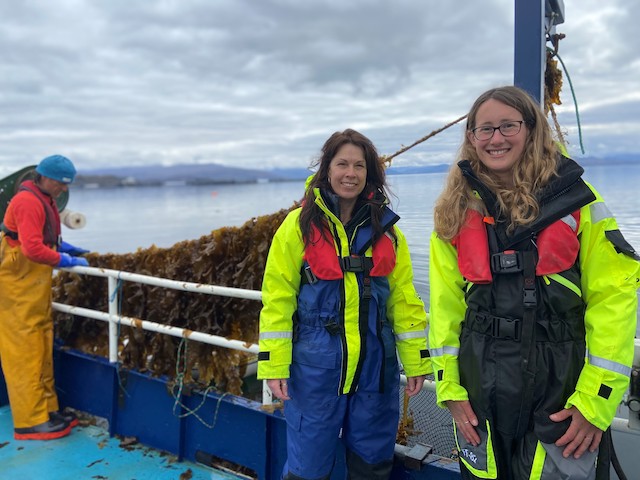Pictured: Yvonne Booth and Laura Tulip.
Collaboration between the University of Stirling, KelpCrofting and Mowi has resulted in the first crop of seaweed harvested from a multi-trophic aquaculture project.
This milestone is important for the businesses and individuals pioneering the use of integrated multi-trophic aquaculture (IMTA) at a commercial scale.
The farm located at off the shores of Scalpay near Skye is part of a study involving the University of Stirling, local shellfish and salmon partners, and sustainable seaweed farming company KelpCrofting.
Ultimately, the study intends to determine whether locating a seaweed and shellfish farm nearby a salmon farm will benefit from the organic nutrients produced by different species of marine life.
Laura Tulip, Environmental Analyst says:
“This is another important milestone at Scalpay.
“The team at KelpCrofting is pleased with its first harvest and whilst we need a control to scientifically prove that the growth and quality of the seaweed has benefited from the nutrient enrichment from our salmon, the early signs are promising.
“Later this year, KelpCrofting will install a new kelp farm in the waters of South Pabay.
“Located away from the salmon farm, this will give us a point of comparison to determine whether the seaweed is directly benefitting from its proximity to salmon.”
KelpCrofting ensures that nothing is wasted from the seaweed, as Kyla Orr, Co-founder and Scientific Director of KelpCrofting, explains:
“So far, we have harvested over eight tons of food grade sugar kelp from Scalpay.
“It is evident that the kelp is growing rapidly with each week that passes, and some fronds are nearly two metres long after only four months at sea.
“We will continue to harvest weekly into June and look forward to seeing how much more this super crop can yield.”
“The kelp being harvested during May and June is part of a collaborative Innovate UK project with Oceanium and Efficiency Technology.
“After each landing, the batches of high-quality kelp are delivered locally to Kyle of Lochalsh for primary processing (chopping), after which it is transported to Oceanium’s trial biorefinery in Cheshire for further processing into nutritional supplements, plant-based protein and biodegradable packaging.”



